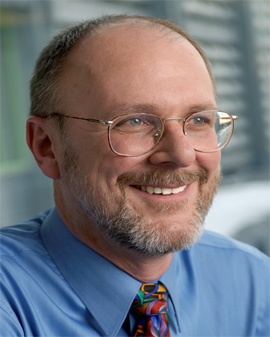New Science Center Gets Boost from Trustee, Wife
| Posted 03/16/07 |
| A $2.5 million pledge from Board of Trustee member Joshua Boger ‘ 73, and Amy Boger will support planning for a new molecular and life sciences building at Wesleyan.
Payette Associates of Cambridge, Mass., is working with faculty in the molecular and life sciences disciplines on programming and feasibility studies for the building, which would replace the Hall-Atwater Laboratory. These studies will provide the basis for a schematic design to be completed within a year. A $1 million gift from Board of Trustees member George Ring P ’98 ’02 and his family has supported the initial planning. The Bogers’ gift is intended both to support this work through the schematic design phase and to catalyze further fundraising for the project. The building is expected to provide at least 175,000 square feet of space and to cost at least $125 million. If fundraising proceeds quickly, construction could begin as early as 2009. Boger believes that, in addition to serving the needs of science faculty, graduate students and science majors, the new building should support the efforts of Wesleyan faculty to address a crucial need for science literacy among college graduates. “The challenge to society is to have everyone comfortable and conversant with the sciences,” he says. “We want all our students to be able to go out into the real world and be players in discussions that involve science issues, to understand what it means to be a scientist, to be confident approaching scientists and talking to them about the many questions of the day that concern science. That means all our students, whether English majors or economists, should have some experience with real science. “Part of the goal for the new building will be to help pull the rest of the campus into the experience of real science,” Boger adds. “We think the architecture should be inviting and support the sense that science is fun.” Wesleyan’s educational model features science graduate programs situated within a traditional liberal arts college, as well as a strong focus on interdisciplinary research and teaching. Wesleyan undergraduates have opportunities to participate in extramurally funded research in close partnership with faculty and graduate students. They frequently participate in upper-level project-based laboratory experiences, and over a third of science majors execute independent research projects in the laboratories of Wesleyan faculty. According to data compiled by the National Science Foundation, Wesleyan consistently ranks among the top 10 baccalaureate colleges in the numbers of students going on to obtain the Ph.D degree in the sciences. Boger began to realize his own love of the sciences when as a boy of nine he began growing potassium permanganate crystals in a lab he set up above the family garage. He also swabbed the mouths of neighborhood playmates and grew cultures in his mother’s refrigerator. “If you had asked me then if I was going to be a scientist, I wouldn’t have understood why you were asking,” he says. “It was simply that science was a fun thing to do. “Fast forward a few years to the day I walked into Max Tishler’s organic chemistry class, and that was a good moment as well,” Boger says. “Max was amazingly animated and passionate about why this was all so important. Peter Leermakers was my Intro to Chem teacher, and he had the same sense of fun.” Boger is a director and vice chairman of BIO, the biopharmaceutical industry trade association; a founding director of the New England Healthcare Institute, and a director of the Hastings Institute. He holds a BA in chemistry and philosophy from Wesleyan and MS and PhD degrees in chemistry from Harvard University. Amy Schafer Boger , a physician and Fellow of the American Academy of Pediatrics, is a professional ceramic artist. “We are grateful to Joshua Boger for his leadership on the Science Advisory Council and the Board of Trustees and to Joshua and Amy for their personal generosity to Wesleyan,” says President Doug Bennet. “Their enthusiasm for Wesleyan science education inspires all of us to think expansively about ways we can advance our work to address a crucial societal need. We look forward to having a facility that will support the experience of science as a vital and integral part of the education all our students receive.” |
| By Justin Harmon, vice president for Public Affairs |


 Joshua Boger, pictured at left, who founded and currently serves as president and CEO of Vertex Pharmaceuticals Inc., of Cambridge, leads Wesleyan’s Science Advisory Council, which works to strengthen the sciences at Wesleyan and to raise their visibility on and off campus. He also has served as a charter trustee of Wesleyan since 1999.
Joshua Boger, pictured at left, who founded and currently serves as president and CEO of Vertex Pharmaceuticals Inc., of Cambridge, leads Wesleyan’s Science Advisory Council, which works to strengthen the sciences at Wesleyan and to raise their visibility on and off campus. He also has served as a charter trustee of Wesleyan since 1999.